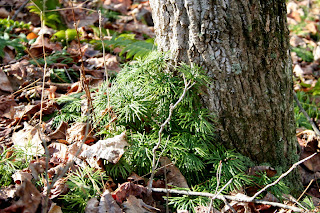The warmth prompted me to go on a long hike over our land to see what's up.

This Golden Ragwort (Senecio aureus) was tricked into growing with the warm weather. These leaves usually show up in late February or early March. The yellow flowers do not appear until May.

The ground cedar (Lycopodium complenatum) is evergreen, providing lots of green during winter.

According to Bernd Heinrich in The Trees in My Forest, these lycopods do not send up strobili or "clubs" until spring. Thanks to Tom for correcting me on my first posting--"the fruiting part of the lycopodium is green when it is fresh - those are gone by."

The ground cedar grows on the ground just like its name but these are the tallest ones I've seen. Heinrich has an interesting discussion of how these lycopods save precious energy by not investing in an elaborate support structure like the tree. They take advantage of the sunlight in the winter if they are not under the snow or fallen leaves.

Ground cedar or running cedar as the locals call it carpets the ground on this slope on the way to our back pastures.

I found this old bucket, or part of it anyway, in the pasture. I wonder how old it is and who used it?

In the back pasture, donkeys were looking for a sweet handout. Our neighbor keeps several donkeys on our land (in exchange he maintains some fences and roads). He started raising them a few years ago. He says they are good to scare off the coyotes so he often keeps them together with his cows, especially when it's calving time.



